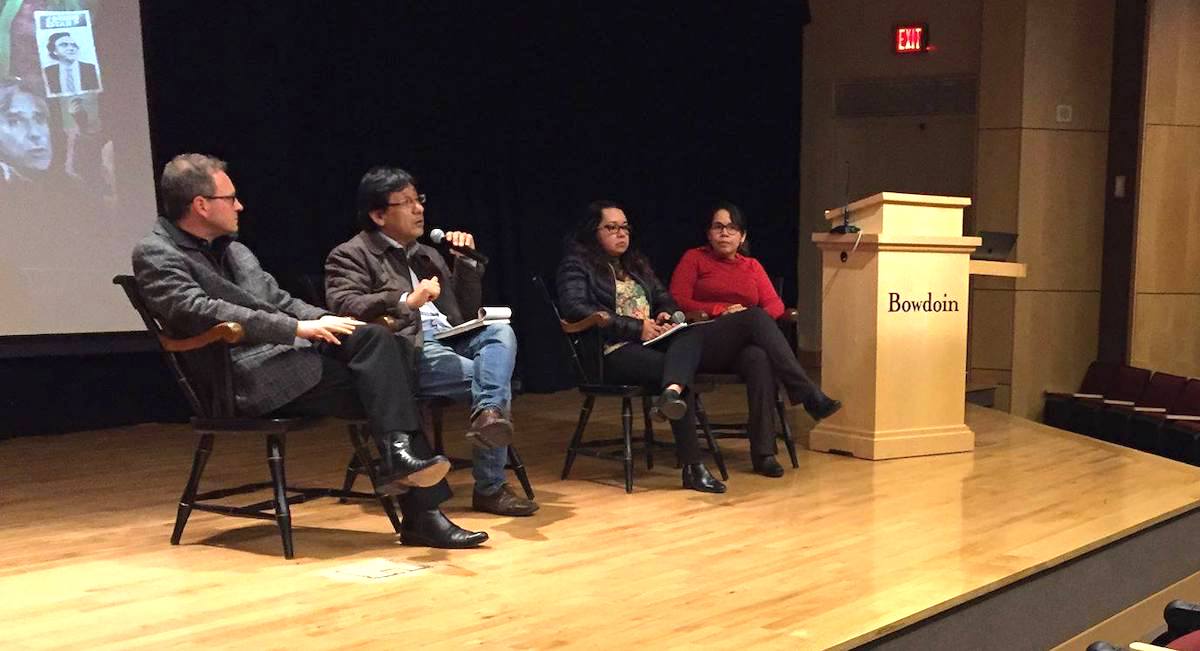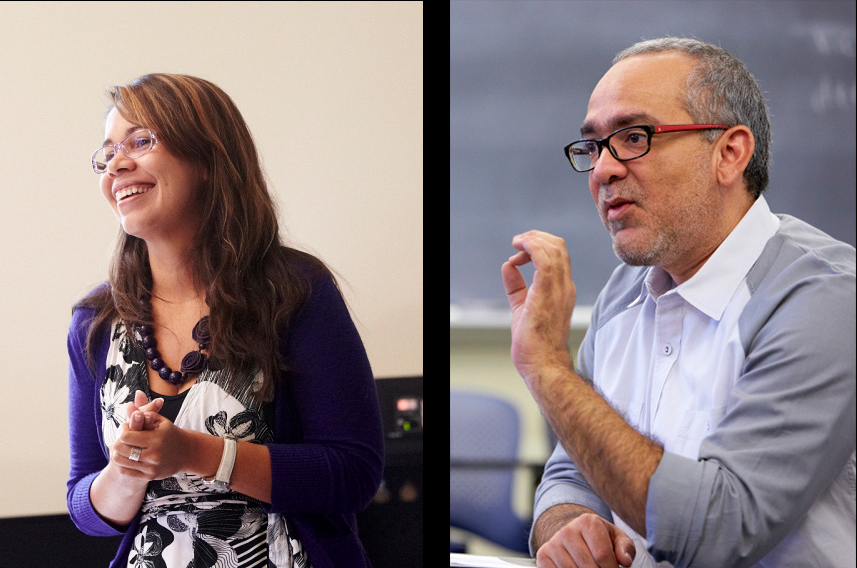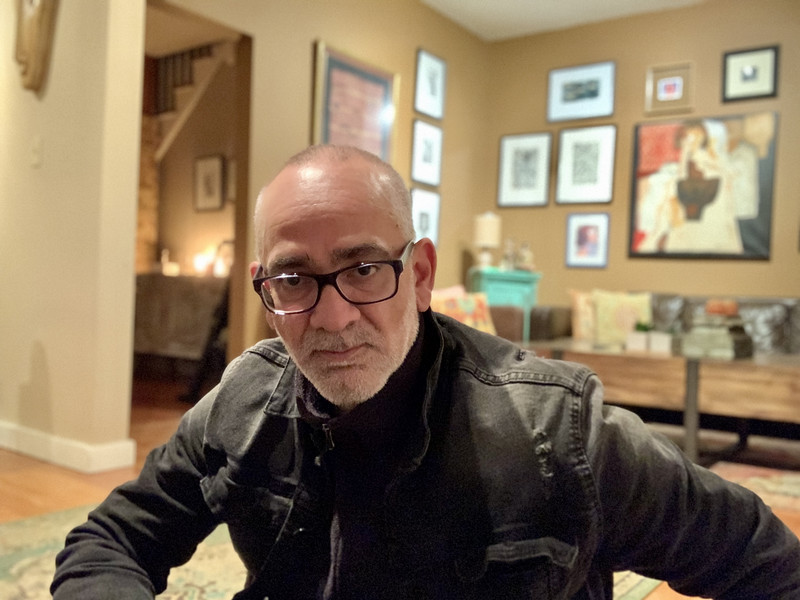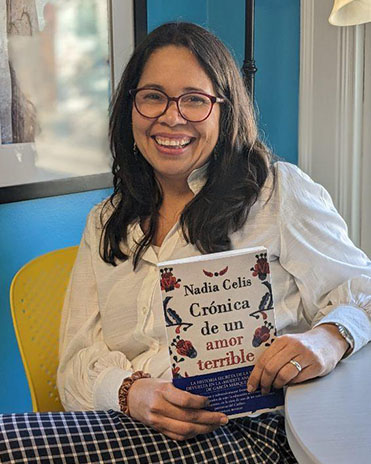Colloquium Explores Memory, Truth and Justice After Conflict
By Jessica Piper ’19What does it take to achieve lasting peace? How do countries find justice when victims are counted not in dozens or hundreds, but millions? How do people reconstruct memory the conflict? What does it mean to say, “Never again”?

Those were just a few of the questions on the table at a recent two-day colloquium at Bowdoin, Memory, Truth and Justice: Lessons from the Peace Processes in South America, on April 22 and 23. The event, organized by Bowdoin Associate Professors of Romance Languages and Literatures Nadia Celia and Gustavo Faverón-Patriau, featured three speakers with expertise in different Latin American conflicts. Its aim was to explore the challenges of building sustainable peace.
Irina Junieles, who spoke on Monday, April 22, is a magistrate on Colombia’s Jurisdicción Especial para la Paz (JEP, or Special Jurisdiction for Peace), a transitional justice system created by the Peace Agreement signed in 2016 between the Colombian government and the FARC, a guerilla movement that had been active in Colombia for more than fifty years. Junieles argued that long term peace depended on not just the absence of conflict, but the extension of the full guarantees of citizenship to all.

A key part of that process in Colombia is the pursuit of truth. For the last decade the Centro Nacional de Memoria Histórica (CNMH, or National Center of Historical Memory), has worked on collecting the memories of the conflict.
After the 2016, a truth commission was created to complement the work of the JEP. The commission is tasked with documenting evidence and memories of the conflict in order to document the effects of the war on the victims, support reparation processes and revitalize traditional cultures that have been marginalized or outright attacked.
In her own work, before joining the JEP, Junieles supported the memory gathering process of the families of fifteen rural residents who were assassinated in the massacre of Los Guáimaros in 2002. Though neither the perpetrator nor the murderers were ever identified, by proving without a doubt the existence of the massacre, their memories opened up room for the victims’ families to demand further justice and reparation. In her current position, Junieles is part of the implementation of a justice model aimed to establish truth as a mean to repair the integrity of the victims.
Félix Reátegu is a senior researcher at the Institute for Democracy and Human Rights Pontificia Universidad Católica del Perú and was the head writer of the final report of Peru’s Truth and Reconciliation Commission in 2003. At the colloquium, he spoke about some of the challenges posed by truth-seeking, noting that memory is often construed into a national narrative, which inevitably simplifies social diversity and pushes out certain voices that may contradict that narrative. Truth and reconciliation reports, moreover, are nearly always academic in nature, rather than written for the people who have been marginalized by conflict.
However, Reátegui noted that truth commissions, though flawed, are better than the alternative, citing Canadian scholar Michael Ignatieff: “Truth commissions are not aimed to be the bearers of all the truth that is there to be exposed. But they reduce the margin of lies that can exist without being challenged in a society.”
Michael Lazzara, professor of Latin American literature and cultural studies at UC-Davis, addressed the construction of memory in Chile after the brutal dictatorship of Augusto Pinochet. He focused on the many iterations of telling and re-telling the story of Jorgelino Vergara.
Known as “El Mocito,” Vergara began working for the Chilean police at the age of sixteen, in a servant-like role in a secret detention center. When he was arrested in 2007—nearly two decades after the fall of the Pinochet regime—he testified against many ex-Pinochet officials, leading to seventy-four convictions.
Since then, Vergara has been portrayed as a victim (for falling into the hands of the dictatorship at a young age), an example of popular fascism (for supporting the regime) and, later, a human rights hero for his testimony against other officials.
Lazzara criticized this last portrayal in particular as downplaying the gravity of crimes to which Vergara was complicit. He noted that, in the aftermath of a violent conflict, it’s typical for people to try to reject any notion that they may have had some responsibility. However, the idea that “we are all victims” of a war or dictator dilutes the very real and painful victimhood the society’s most marginalized experience.
After Lazzara’s lecture, the three speakers gathered for a roundtable to take questions from students and professors. Alternating between English and Spanish (Junieles delivered her lecture in Spanish, while the other two spoke in English), they discussed how issues of memory and justice played out differently in different countries and different eras. Still, they concurred that acknowledging that violence happened was the most basic, crucial condition for reconciliation, in any scenario.
The colloquium was sponsored by the Latin American Studies Program’s Allen Wells (formerly Crandall) Fund, the Charles F. Adams Lectureship Fund and the Departments of Romance Languages and Literatures and Government and Legal Studies.



